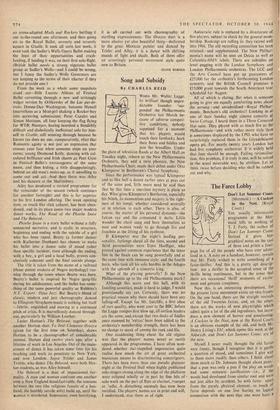Song and Subsidy
CHARLES REID
B y
Since the performance was typical Klemperer and as like half a dozen earlier ones as peas out of the same pod, little more need be said than that by this time a one-time mystery is plain as day. What gives Klemperer's Beethoven, especially his Ninth, its momentum and majesty is the right- ness of his tempi, whether considered severally or in relation to each other. There is also, of course, the matter of his personal dynamic—the falcon eye and. the command it darts. Little wonder the choir sang and bore themselves as men and women ready to go through fire and frostbite at the lifting of his eyebrow.
If Klemperer was the night's leading per- sonality, furlongs ahead all the time, second and third personalities were Ernst Haefliger, who proved against common experience that the tenor line in the finale can be sung powerfully and at the same time with immense style; and the fourth horn, who took all his solo hurdles in the Adagio with the aplomb of a concerto king.
What of the playing generally? Is the New Philharmonia up to the old Philharmonia mark?
Although this score. and this hall, with its foozling acoustics, made it hard to judge, I would provisionally say yes. Certainly, there was no practical reason why there should have been any falling-off. Except for Mr. Sutcliffe, a first oboe of rare quality, who went over to the BBC before the Legge rumpus first blew up, all section leaders are the same; and,except that two desks of fiddles once manned by 'extras' have been added to the orchestra's membership strength, there has been no change to speak of among the rank and file.
One maddening thing about the old regime was that the players' names never or rarely appeared in the programmes. I have often won- dered whether star-stupefied impresarios quite realise how much the art of great orchestral musicians means to discriminating concertgoers. There has been more than one pseudo glamour night at the Festival Hall when highly publicised solo singers strung along the edge of the platform were eclipsed wholly or in part by fine bits of solo work on the part of flute or clarinet, trumpet or 'cello. A disturbing anomaly has now been rectified.. The players' names are in print and will, I understand, stay there as of right.
Autocratic rule is replaced by a directorate of five players, subject to check by the general mem- bership. Bookings are rolling in; they extend well into 1966. The old recording connection has been retained—and supplemented. The New Philhar- monia's name will be seen on Decca as well as Columbia-HMV labels. There are subsidies on level pegging with the London Symphony and London Philharmonic orchestras. The LCC and the Arts Council have put up guarantees of £25,000 for the orchestra's forthcoming London concerts, and the British Council promises a £15,000 grant towards the South American tour scheduled for August.
All of which is elating. But when is someone going to give me equally comforting news about the unsung—and unsubsidised—Royal Philhar- monic, Beecham's old orchestra? Looking in at one of their Sunday night cinema concerts at Swiss Cottage, I heard them in a Three Cornered Hat suite. They played with as much fire as the Philharmonia—and with rather more style than is sometimes displayed by the LPO, who have so surprisingly replaced them in the Glyndebourne opera pit. For nearly twenty years London has had five symphony orchestras. It is widely held that four should be enough. Failing rationalisa- tion, this problem, if it truly is one, will be solved in the usual miserable way, by attrition. Let us think twice before deciding who shall be rubbed out and why.


































 Previous page
Previous page